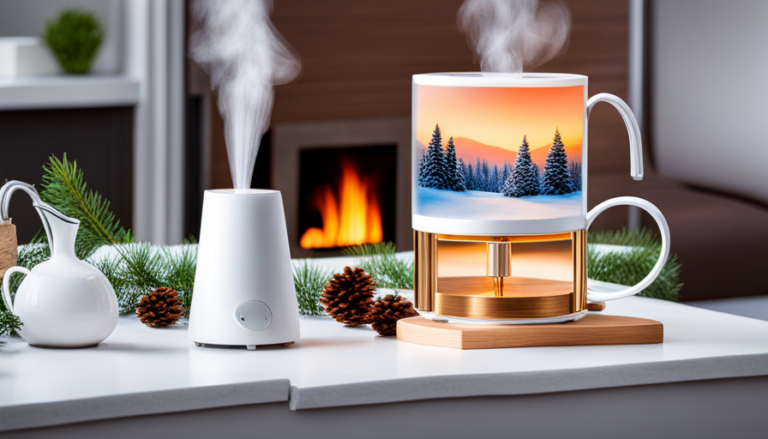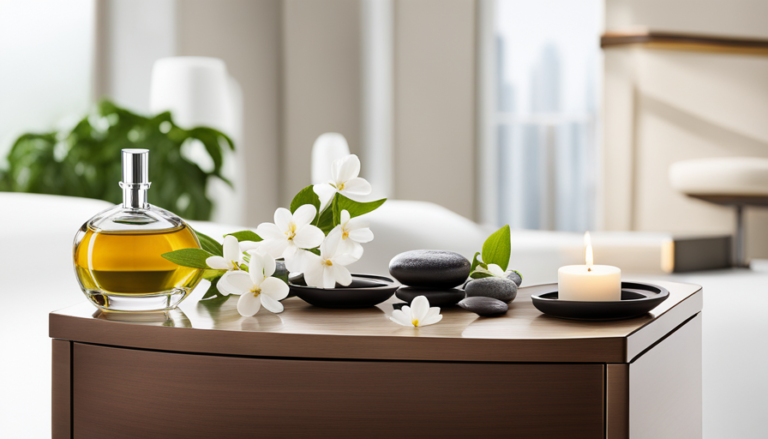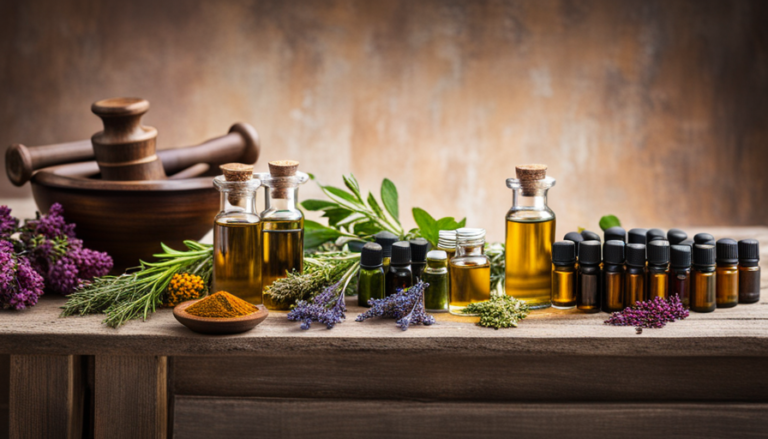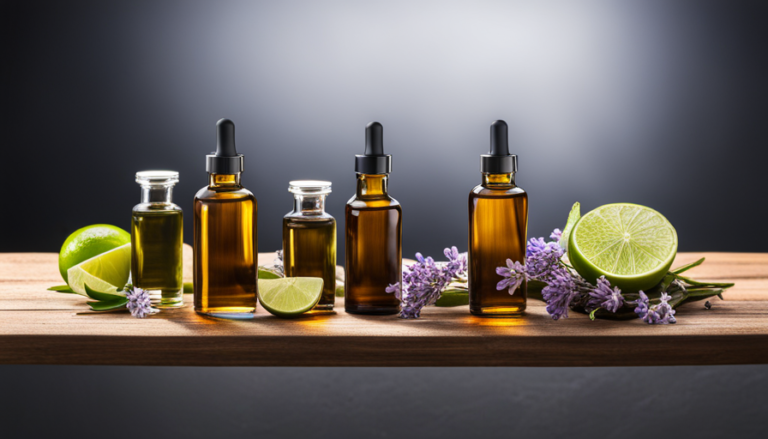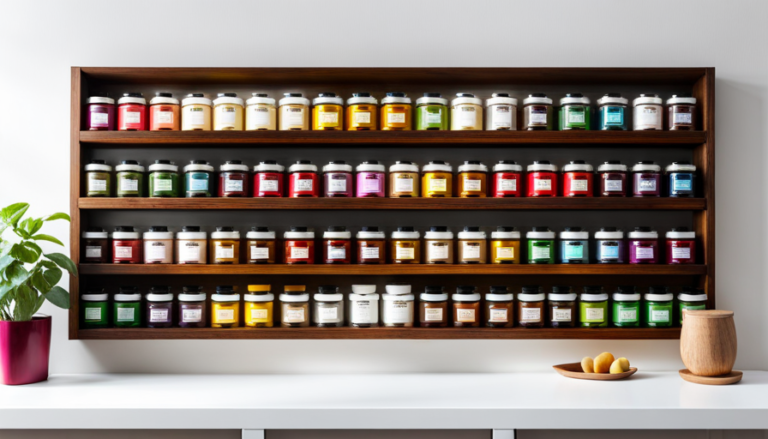How to Safely Remove Essential Oil Stains from Your Clothes
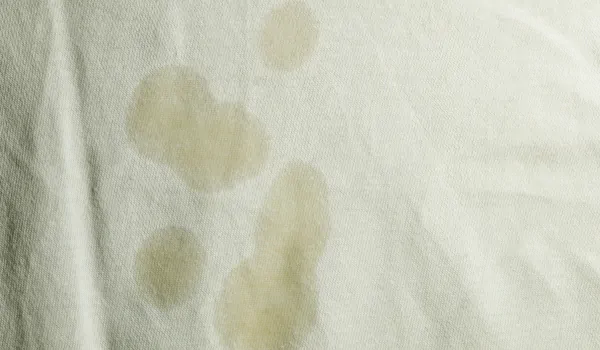
There are times when essential oil stain removers don’t come to the rescue. While it is easy and convenient to remove essential oil stains from our hands or faces, removing them from clothes and fabrics can be tricky.
If you’re wondering how to safely remove essential oil stains from clothes, worry not. Here’s a comprehensive guide on how to do the same, complete with laundry hacks that make the process simpler. Whether you’re washing your clothes at home or at a laundry mat, we have tips for all situations.
How To Remove Essential Oil Stains From Clothing
If essential oils stain your clothing, follow these steps to safely remove the oil stains.
- First, blot the oil stain with a paper towel to absorb the oil.
- Then, add baking soda for absorbency. This will help draw the oil out of the fabric and away from the stain.
- Apply lemon essential oil to the stain. This will help dissolve the oil and draw it out of the fabric. Wash the item immediately with dish detergent and water.
- To remove baking soda residue, rub it in gently with a clean towel or brush.
- Finally, add a small amount of dish soap and mix before laundering to remove any additional baking soda residue left behind.
By following these steps, you can safely remove oil stains from your clothing without leaving a trace of oil behind on your clothes or fabric.
Alternatives to get essential oils out of clothes?
If essential oils stain clothing, it’s best to remove them using natural stain removers or commercial products. Use dish soap or rubbing alcohol to effectively clean oil stains from clothes. Natural stain removers or commercial stain removers should be used sparingly and only on stains that are visible. Blot the stain with a cloth and detergent. The detergent will help dissolve the oil stain, while the cloth will absorb the cleaning agent.
If essential oils stain clothing, use a mixture of baking soda and water as a stain remover. Swipe the area with a towel dampened with water and baking soda, then let it sit for several minutes before washing the item as usual.
It’s also important to note that essential oils can damage laundry detergent fabrics if not properly cared for. {EOS}
Pretreatment
If you have essential oil stains on your clothing, it’s important to treat the area thoroughly. Blot excess oil with a paper towel or clean rag. Place paper towels on both sides of the stain to sandwich the area and absorb the oil. Wash stained clothing using a laundry detergent with a laundry soap that contains a grease-removing agent. If the stain is not coming out easily, use rubbing alcohol or white vinegar to help neutralize the stain. Do not put stained clothing in the dryer; this will only make the stain worse. Instead, place the clothes in a washing machine filled with cold water and detergent for a few minutes. Finally, use WD-40 to remove old essential oil stains from your clothes.
Use Dish Soap
Dish soap is an effective way to remove essential oils from clothing. To ensure the stain is completely removed, it is best to use dish soap that is specifically designed for stain removal and washing clothes. For a more thorough clean, mix a gallon of warm water with two tablespoons of dish soap and let the clothing soak for 20 minutes before washing it. Use an old toothbrush, sponge, or rag to rub the soap into the stained area.
After washing the affected area, thoroughly rinse it with warm water to remove any detergent or stain-removing agent that may have been present. If the stain persists after washing, a mixture of 8 parts water, 1 part dishwashing detergent, and 1 part glycerin can be applied to the stained area. This mixture will help remove oil stains from clothing without leaving a residue behind.
Use Baking Soda
Baking soda is a very effective stain-removing method for essential oil stains. You can use it to blot the stain and absorb the excess oil before washing the clothing. It is essential to create a solution of one part water and one part baking soda and soak the clothing in this solution for 10-15 minutes. Natural dish soap and oxygen bleach can also be used to remove essential oil stains from clothes. Before washing laundry, ensure that you rub the stain to push the excess oil further into the fabric. This will make it easier to remove the stain. Additionally, it is important to keep in mind that essential oils are natural ingredients and may be safe in small quantities; therefore, it is best to avoid over-using them.
Use Rubbing Alcohol
Rubbing alcohol or isopropyl alcohol can help to remove essential oil stains from clothes. To do so, create an essential oil fabric spray with vodka or witch hazeling and 10 drops of essential oil of your choice. Additionally, solvents like rubbing alcohol, acetone-based nail varnish remover, or commercial stain remover can be used to remove oil stains from everyday cottons. To ensure the stain is completely removed and the garment looks clean and stain-free, it is best to apply the stain removing solution to a small hidden area of the garment before applying it to the whole area. Once the oil stain has been removed, simply wash the garment as usual to restore its original look and quality.
Use Vinegar
For essential oil stains, adding a half cup of distilled white vinegar to the rinse cycle of your washing machine can help remove the oil odor from laundry. For bigger and darker stains, you can pre-soak the fabric into 70% rubbing alcohol followed challenging it with a cotton swab. After washing the item in hot water, put the clothing in the dryer with detergent and half a cup of white vinegar to help melt and dissolve oil stains. Common household products such as dish soap or rubbing alcohol can also be used to remove essential oils from clothing. For stain removal, consider using commercial stain removers in liquid, gel, or stick form. These types of products are readily available at most stores and are efficient at removing oil stains from clothes without damaging the fabric.
How to get essential oil stains from cotton and washable fabrics:
If essential oil stains are a problem for you, there are several steps you can take to get rid of the stains and keep your clothes looking fresh and clean. The first step is to pre-treat the stain with a washing detergent. Use detergent that has enzymes added to help break down oil stains, such as Tide detergent with bleach or Persil detergent with stain remover.
Another option is to use liquid Tide stain release liquid or detergent that has essential oils included in the formula. Directly apply lemon essential oil to the stain and watch as the oil dissolves the oil in the fabric. Another option is to use a natural stain remover or commercial stain remover in liquid, gel or stick form. If the stain remains after using these steps, try washing the garment again.
Blot the stains with a paper towel or rag
When it comes to getting essential oil stains out of clothes, there are several steps you can take. First, blot the stain with a paper towel to help remove excess oil and keep the stain from setting. Then, press gently when blotting to avoid spreading the stain. Next, pre-treat the stain with liquid dish soap or baking soda to help loosen the stain before washing. Finally, don’t put the garment in the dryer until the stain is completely gone. Instead, dry your shirt in the shade away from direct heat to minimize any risk of damaging the fabric. Instead, use baking soda to absorb excess oil and draw it out of the fabric.
Make Use of baking soda
Baking soda is a popular and effective way to remove oil stains from your laundry. It works by absorbing the oil and grease stain, making it easily washable. However, before applying baking soda to the stain, it is important to blot the stain with a paper towel or absorbent cloth to remove excess liquid from the fabric. Next, sprinkle baking soda on the stain and press it into the fabric. Let the baking soda-covered stain sit for 30 minutes to an hour. Afterward, use a toothbrush to rub the baking soda into the stain. This will help dislodge the stain and reduce its appearance. If the stain remains after trying this method, repeat steps 1 through 4 until the stain is no longer visible.
Pre-clean & soak with dish soap
Pre-treating essential oil stains on cotton is essential to removing the stain quickly and efficiently. To do this, you can use liquid dish soap or baking soda.
After washing the stain, use an old toothbrush, sponge, or rag to rub the soap in well. Blot the stain instead of rubbing it in, as rubbing could push the stain further into the fabric. After removing the stain from your garment, machine-dry it completely before wearing it again. This will ensure that the stain doesn’t come back. Instead, opt for low heat drying to reduce the risk of setting the oil stain.
Wash the clothes on a hot cycle
Washing clothes on a hot cycle is a quick and effective way to remove oil stains from clothing. You can use high-quality laundry detergent when washing clothes on a hot cycle to prevent damaging the fabric. Quickly treating oil stains after they occur will help ensure successful removal. If you are washing white clothes, washing in cold water can bleach the fabric, which may cause the stain to appear darker. On the other of hand, washing in hot water will not bleach the fabric and will instead stain it. For best results, it is best to wash white clothes in hot water and stain-proof laundry detergent.
If you are looking for tips on removing essential oil stains from your clothes, consider using laundry detergent with stain-fighting properties or sprinkling some baking soda on the stain and blotting it with a clean towel. Additionally, commercial stain removers can be used to remove oil stains from clothing at a risk of further damage to the fabric. However, these products are best used as a last resort as they often contain strong chemicals that can be harmful to the environment and human health
Eucalyptus a Natural Detergent Handy Than You Think
Eucalyptus oil is a versatile detergent that can be used to tackle a wide range of cleaning tasks. It contains essential oils such as eucalyptol, which has antibacterial properties and the volatile oil cineol, which is a solvent. Eucalyptus oil is effective at removing grease stains due to its cineol content. Additionally, essential oils have the ability to cleanse and freshen the air, which makes them a handy cleaning tool for homes and offices alike.
Eucalyptus oil can be used to renovate furniture and cars by washing with it. It can also be used to reduce cold symptoms, reduce inflammation, and prevent bad breath. Essential oils, including eucalyptus oil, have the ability to scent laundry detergent and as a fabric softener. They are safe to use in small amounts without causing harm or discoloration. However, essential oils should not be dripped directly into the dryer as they could cause a fire. Instead, they should be added to the laundry detergent or clothes as per the directions on the pack.
How to Use Essential Oils on Clothes Without Staining Them?
When washing clothes with essential oil stains, it’s important to dilute the essential oil before application to avoid staining clothes. Additionally, essential oil diffusers can be used to thoroughly perfume clothes without worrying about oil stains or overuse. Avoid adding essential oils to laundry detergent as this can cause staining.
Instead, invest in stain removers made of natural ingredients like dish soap or rubbing alcohol. These stain removers can easily remove essential oil stains from clothing. Also, consider investing in essential oil-free detergent options if essential oils are a concern. Overall, essential oil stains on clothes can be easily removed with the right steps and essential oils.
How to Make Essential Oil Fabric Spray
- Create an essential oil fabric spray using a 3 ounce/90 ml or larger spray bottle, distilled or purified water, vodka or witch hazel, and your favorite essential oil.
- To begin, add 0.5 ounces/15 ml of vodka or witch hazen into the spray bottle.
- Add 10 drops of your favorite essential oil or blend into the spray bottle.
- Shake the mixture for half a minute and then gently spray onto the affected fabric.
- The fabric stain should be removed with detergent and water as outlined in the washing instructions on the fabric tag.
However, it is best to use essential oils as a stain remover in case the detergent irritates your skin or clothes. If the stain remains after washing, try baking soda paste or dish soap.
Choose a stain remover that is safe for fabrics and skin with no essential oils in it. After washing, check for any stains that may have been removed by using an essential oil stain remover.
The oil may act as a natural deodorizer and help prevent stains from reappearing.
What dissolves essential oils?
Essential oils are a great way to add aromas and health benefits to any home or product. However, they can sometimes be difficult to dissolve. Here are some methods that you can use to help dissolve essential oils:
Baking soda: Baking soda is a great option for dissolving essential oils as it has natural alkaline properties. Simply add baking soda to the oil and mix until dissolved.
White vinegar: Adding white vinegar to your washing machine’s rinse cycle helps to dissolve essential oils locked in fabrics. It is especially good for grease stains or oil-based stains.
Lemon essential oil: You can apply lemon essential oil directly to the stain, allow it to sit for a few minutes and then wash it as normal. This helps break down the oil and make it easier to remove from the fabric.
Oxygen bleach: Oxygen bleach is an alternative cleaning detergent that helps dissolve essential oils without being harsh on the fabric.
Vegetable glycerine: If you want something a bit more natural and gentle, then vegetable glycerine can be used as an emulsifier to help dissolve essential oils in water-based solutions.
Conclusion
Using essential oils in laundry detergent is a good way to avoid stains from essential oil-infused laundry. However, essential oil fabric spray is the safest way to use essential oils in laundry. It allows for the scent of essential oils to come through without staining your clothing or washing machine. The recipe for essential oil fabric spray is simple and easy to make. You just need a spray bottle and the essential oils of your choice. We suggest using lavender essential oil as it is known for its stain-preventing qualities and pleasant smell. Just add a few drops of the essential oil of your choice to a spray bottle filled with water. Shake well and spray on clothes before washing them.

